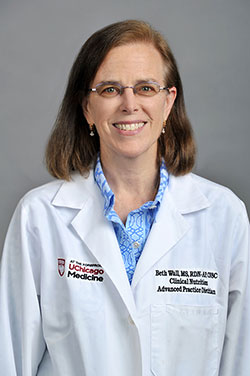Written by Anna Gomberg, featuring Beth Wall, RD
Everyone eats, and most everyone makes choices to try to keep their bodies healthy. But when it comes to nutrition, there are many unanswered questions that keep dietitians like UChicago Medicine Digestive Diseases Center’s Beth Wall, RDN-AP, hard at work examining the complexities of the human diet, in order to help patients live their best lives.
Explains Beth, “My passion is feeding people. Feeding people who have difficulties eating, whether it is because they have short bowel syndrome, high ostomy output, terrible diarrhea, or severe cramping or bloating, or they just need IV nutrition—for me, this is my passion, and what has kept me here for 32 years.”
The dietitians and nutrition team at the University of Chicago Medicine work with many of the most severe cases of malnutrition and the ramifications of complex digestive diseases, addressing conditions like short bowel syndrome, Crohn’s disease, and SMA (superior mesenteric artery) syndrome, among others.
In short bowel syndrome a patient is left with fewer than 200 centimeters of small bowel, due to other disease activity, cancer, or intestinal injury. A very rare condition, affecting only 3 in one million people1, in short bowel syndrome, digested food moves too rapidly through the body, and there isn’t enough absorptive surface area remaining to absorb the needed nutrients and fluids to maintain good health and hydration. Often short bowel syndrome patients require TPN, or total parenteral nutrition, a means of delivering nutrients directly to the bloodstream, which requires careful calibration by nutrition support clinicians on a weekly or monthly basis.
Because scientists have “mapped” the small bowel, or identified where different nutrients are absorbed in the intestinal tract, dietitians can predict the specific nutritional deficits that will manifest in patients with different anatomical anomalies.
Explains Wall, “it is interesting to think that you can, in fact, pinpoint the nutritional deficits associated with all of this and what is needed to help people live a more normal life, which is always our goal.”
Nutritional deficits touch all aspects of the body. For instance, the superior mesenteric artery (SMA), part of the circulatory system, rests on top of a pad of fat above the duodenum, the part of the digestive system that connects the stomach to the small intestine. In cases of extreme weight loss, due to digestive diseases like severe Crohn’s disease, this mesenteric fat pad can disappear, and the artery can compress the duodenum. This makes it even harder for the patient to eat, causing obstructions, a pattern called SMA syndrome2.
“It is fascinating and heart-breaking, and really complex,” explains Wall. “The patient now can’t eat because of pain and bloating, and they want to know, ‘Why am I vomiting? Do I have Crohn’s in my stomach now?’ For such patients with rare complications, it is critical that their health care team has sufficient multidisciplinary expertise to peel away the different layers and address the main issues underlying the dysfunction.”
Ed McDonald, a gastroenterologist at the University of Chicago Medicine Digestive Diseases Center and nutrition expert agrees. “Giving your body the nutrients it needs should be simple, but getting adequate nutrition for people living with digestive diseases can be punishingly difficult, without the right expertise. We always encourage our patients to meet with a dietitian if they have any questions about their diet.”
There is a long history of such multidisciplinary collaboration at the University of Chicago Medicine, and for Wall, it stems from the legacy of Dr. Joseph Kirsner, one of the founders of the GI Research Foundation and longtime champion of digestive diseases at the University of Chicago Medicine.
“Dr. Kirsner was a very, very smart man, with a lot of integrity. He was very inclusive with the whole group. He really enjoyed teaching and including the social worker, the dietitian, and the physical therapist in the treatment of patients. In those days, they would round with a huge team (and have donuts—back when it was okay to have donuts every morning!) I was lucky to have that experience with him,” says Wall.
She continues, “But I feel that all the gastroenterologists carry this forward, and are very inclusive and tuned into nutrition. They are very supportive of the dietitians and the work that we do. When you have support and you have people who believe in you, it just makes work easier and more fulfilling.”
McDonald underscores the importance of dietitians on the team, saying, “Physicians often focus on tests, procedures, or medications, while being unaware that someone is severely malnourished. Dietitians never forgot that food matters in almost every treatment plan.”
Sources
1 https://www.niddk.nih.gov/health-information/digestive-diseases/short-bowel-syndrome#common
2 https://rarediseases.info.nih.gov/diseases/7712/superior-mesenteric-artery-syndrome

